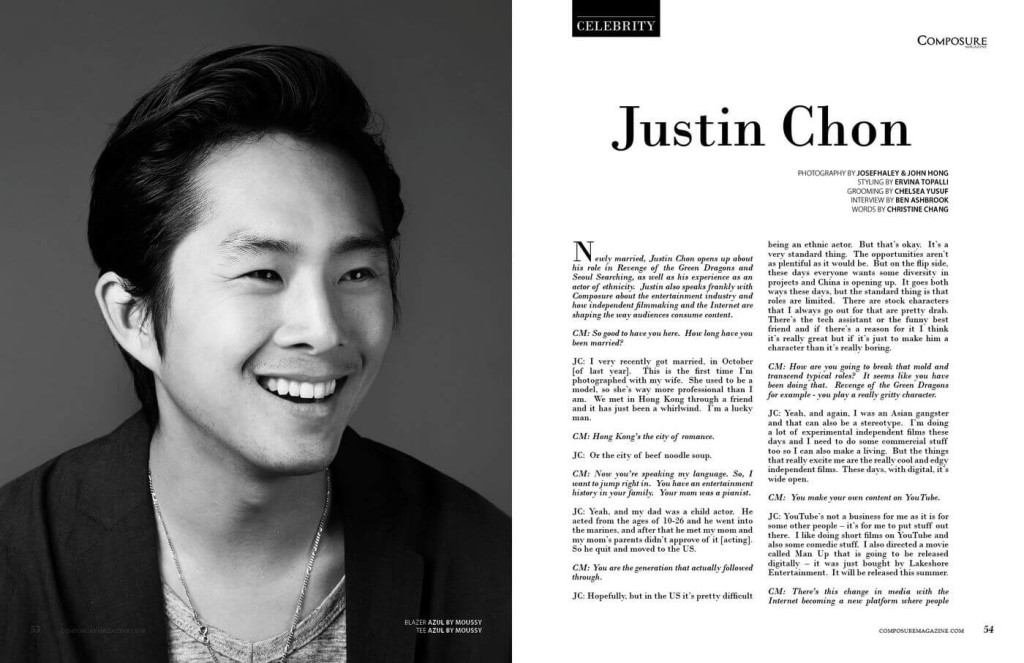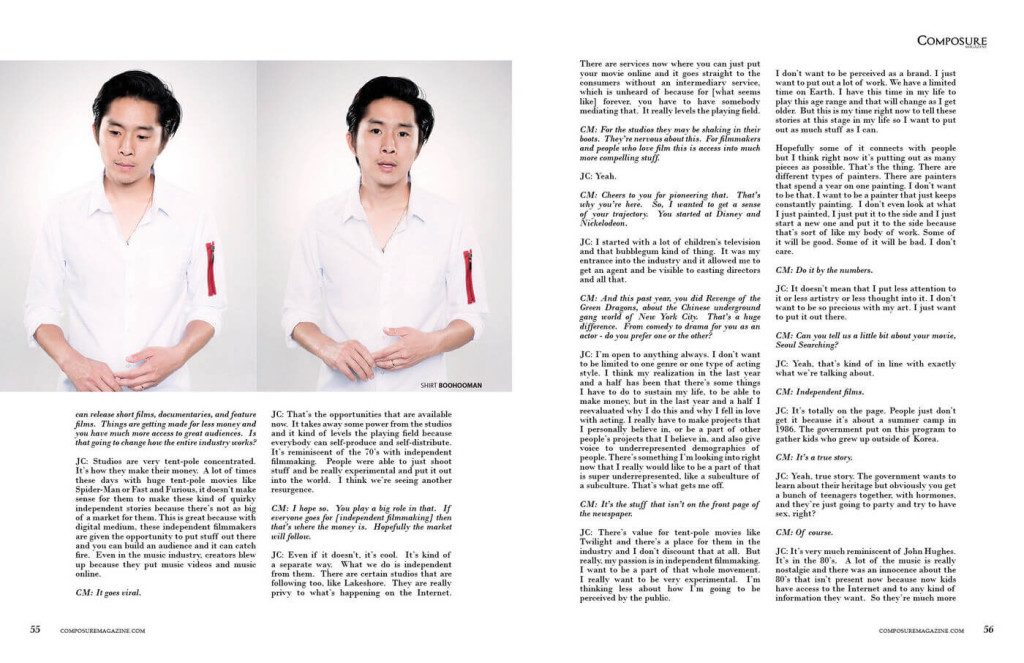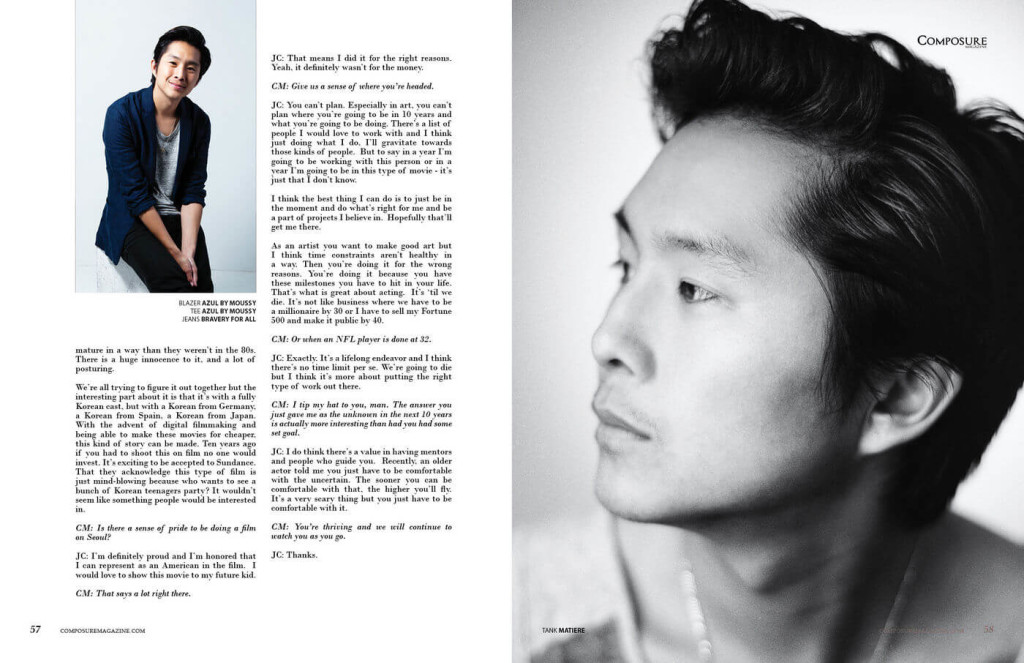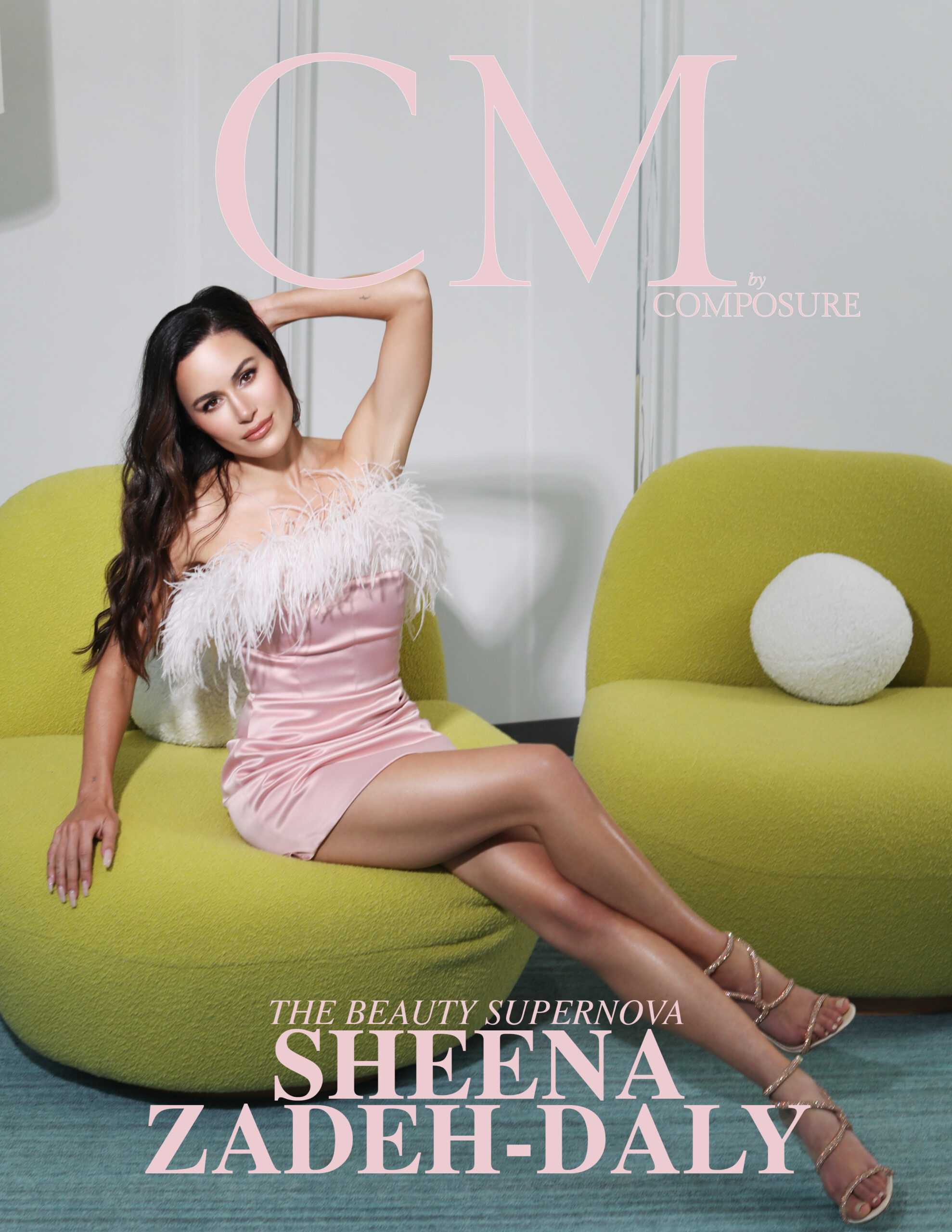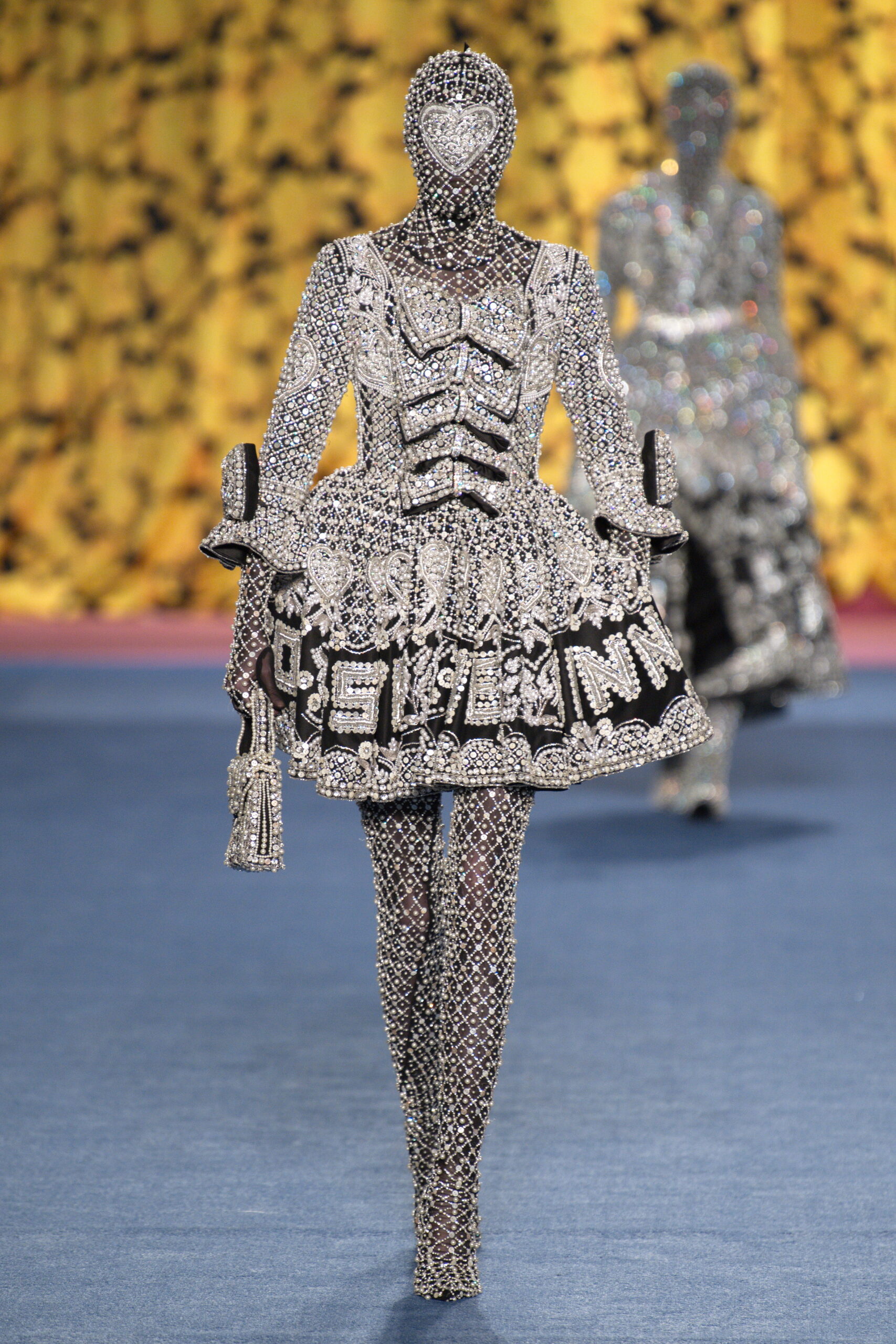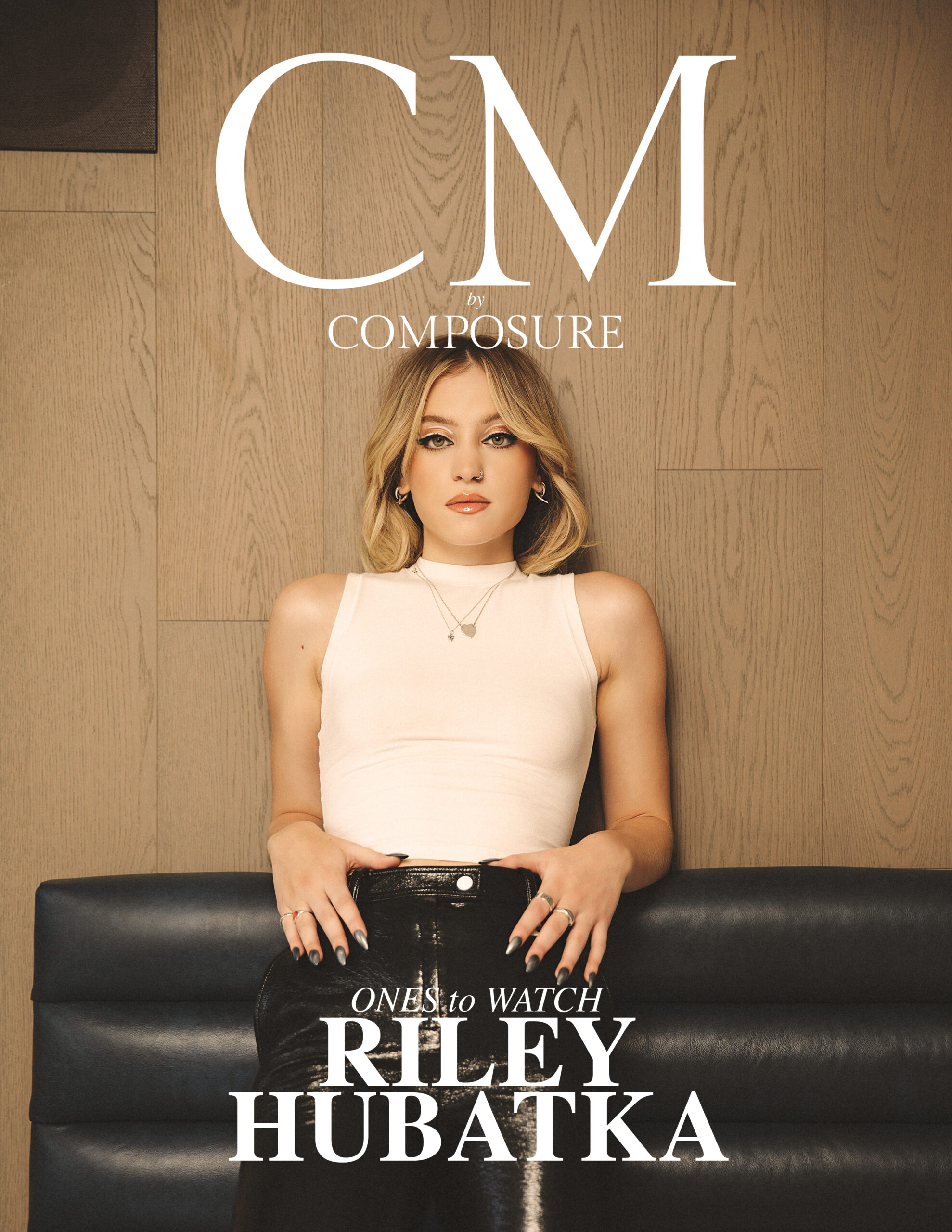Newly married, Justin Chon opens up about his role in Revenge of the Green Dragons and Seoul Searching, as well as his experience as an actor of ethnicity. Justin also speaks frankly with Composure about the entertainment industry and how independent filmmaking and the Internet are shaping the way audiences consume content.
CM: So good to have you here. How long have you been married?
JC: I very recently got married, in October [of last year]. This is the first time I’m photographed with my wife. She used to be a model, so she’s way more professional than I am. We met in Hong Kong through a friend and it has just been a whirlwind. I’m a lucky man.
CM: Hong Kong’s the city of romance.
JC: Or the city of beef noodle soup.
CM: Now you’re speaking my language. So, I want to jump right in. You have an entertainment history in your family. Your mom was a pianist.
JC: Yeah, and my dad was a child actor. He acted from the ages of 10-26 and he went into the marines, and after that he met my mom and my mom’s parents didn’t approve of it [acting]. So he quit and moved to the US.
CM: You are the generation that actually followed through.
JC: Hopefully, but in the US it’s pretty difficult being an ethnic actor. But that’s okay. It’s a very standard thing. The opportunities aren’t as plentiful as it would be. But on the flip side, these days everyone wants some diversity in projects and China is opening up. It goes both ways these days, but the standard thing is that roles are limited. There are stock characters that I always go out for that are pretty drab. There’s the tech assistant or the funny best friend and if there’s a reason for it I think it’s really great but if it’s just to make him a character than it’s really boring.
CM: How are you going to break that mold and transcend typical roles? It seems like you have been doing that. Revenge of the Green Dragons for example – you play a really gritty character.
JC: Yeah, and again, I was an Asian gangster and that can also be a stereotype. I’m doing a lot of experimental independent films these days and I need to do some commercial stuff too so I can also make a living. But the things that really excite me are the really cool and edgy independent films. These days, with digital, it’s wide open.
CM: You make your own content on YouTube.
JC: YouTube’s not a business for me as it is for some other people – it’s for me to put stuff out there. I like doing short films on YouTube and also some comedic stuff. I also directed a movie called Man Up that is going to be released digitally – it was just bought by Lakeshore Entertainment. It will be released this summer.
CM: There’s this change in media with the Internet becoming a new platform where people can release short films, documentaries, and feature films. Things are getting made for less money and you have much more access to great audiences. Is that going to change how the entire industry works?
JC: Studios are very tent-pole concentrated. It’s how they make their money. A lot of times these days with huge tent-pole movies like Spider-Man or Fast and Furious, it doesn’t make sense for them to make these kind of quirky independent stories because there’s not as big of a market for them. This is great because with digital medium, these independent filmmakers are given the opportunity to put stuff out there and you can build an audience and it can catch fire. Even in the music industry, creators blew up because they put music videos and music online.
CM: It goes viral.
JC: That’s the opportunities that are available now. It takes away some power from the studios and it kind of levels the playing field because everybody can self-produce and self-distribute. It’s reminiscent of the 70’s with independent filmmaking. People were able to just shoot stuff and be really experimental and put it out into the world. I think we’re seeing another resurgence.
CM: I hope so. You play a big role in that. If everyone goes for [independent filmmaking] then that’s where the money is. Hopefully the market will follow.
JC: Even if it doesn’t, it’s cool. It’s kind of a separate way. What we do is independent from them. There are certain studios that are following too, like Lakeshore. They are really privy to what’s happening on the Internet. There are services now where you can just put your movie online and it goes straight to the consumers without an intermediary service, which is unheard of because for [what seems like] forever, you have to have somebody mediating that. It really levels the playing field.
CM: For the studios they may be shaking in their boots. They’re nervous about this. For filmmakers and people who love film this is access into much more compelling stuff.
JC: Yeah.
CM: Cheers to you for pioneering that. That’s why you’re here. So, I wanted to get a sense of your trajectory. You started at Disney and Nickelodeon.
JC: I started with a lot of children’s television and that bubblegum kind of thing. It was my entrance into the industry and it allowed me to get an agent and be visible to casting directors and all that.
CM: And this past year, you did Revenge of the Green Dragons, about the Chinese underground gang world of New York City. That’s a huge difference. From comedy to drama for you as an actor – do you prefer one or the other?
JC: I’m open to anything always. I don’t want to be limited to one genre or one type of acting style. I think my realization in the last year and a half has been that there’s some things I have to do to sustain my life, to be able to make money, but in the last year and a half I reevaluated why I do this and why I fell in love with acting. I really have to make projects that I personally believe in, or be a part of other people’s projects that I believe in, and also give voice to underrepresented demographics of people. There’s something I’m looking into right now that I really would like to be a part of that is super underrepresented, like a subculture of a subculture. That’s what gets me off.
CM: It’s the stuff that isn’t on the front page of the newspaper.
JC: There’s value for tent-pole movies like Twilight and there’s a place for them in the industry and I don’t discount that at all. But really, my passion is in independent filmmaking. I want to be a part of that whole movement. I really want to be very experimental. I’m thinking less about how I’m going to be perceived by the public.
I don’t want to be perceived as a brand. I just want to put out a lot of work. We have a limited time on Earth. I have this time in my life to play this age range and that will change as I get older. But this is my time right now to tell these stories at this stage in my life so I want to put out as much stuff as I can.
Hopefully some of it connects with people but I think right now it’s putting out as many pieces as possible. That’s the thing. There are different types of painters. There are painters that spend a year on one painting. I don’t want to be that. I want to be a painter that just keeps constantly painting. I don’t even look at what I just painted, I just put it to the side and I just start a new one and put it to the side because that’s sort of like my body of work. Some of it will be good. Some of it will be bad. I don’t care.
CM: Do it by the numbers.
JC: It doesn’t mean that I put less attention to it or less artistry or less thought into it. I don’t want to be so precious with my art. I just want to put it out there.
CM: Can you tell us a little bit about your movie, Seoul Searching?
JC: Yeah, that’s kind of in line with exactly what we’re talking about.
CM: Independent films.
JC: It’s totally on the page. People just don’t get it because it’s about a summer camp in 1986. The government put on this program to gather kids who grew up outside of Korea.
CM: It’s a true story.
JC: Yeah, true story. The government wants to learn about their heritage but obviously you get a bunch of teenagers together, with hormones, and they’re just going to party and try to have sex, right?
CM: Of course.
JC: It’s very much reminiscent of John Hughes. It’s in the 80’s. A lot of the music is really nostalgic and there was an innocence about the 80’s that isn’t present now because now kids have access to the Internet and to any kind of information they want. So they’re much more mature in a way than they weren’t in the 80s. There is a huge innocence to it, and a lot of posturing.
We’re all trying to figure it out together but the interesting part about it is that it’s with a fully Korean cast, but with a Korean from Germany, a Korean from Spain, a Korean from Japan. With the advent of digital filmmaking and being able to make these movies for cheaper, this kind of story can be made. Ten years ago if you had to shoot this on film no one would invest. It’s exciting to be accepted to Sundance. That they acknowledge this type of film is just mind-blowing because who wants to see a bunch of Korean teenagers party? It wouldn’t seem like something people would be interested in.
CM: Is there a sense of pride to be doing a film on Seoul?
JC: I’m definitely proud and I’m honored that I can represent as an American in the film. I would love to show this movie to my future kid.
CM: That says a lot right there.
JC: That means I did it for the right reasons. Yeah, it definitely wasn’t for the money.
CM: Give us a sense of where you’re headed.
JC: You can’t plan. Especially in art, you can’t plan where you’re going to be in 10 years and what you’re going to be doing. There’s a list of people I would love to work with and I think just doing what I do, I’ll gravitate towards those kinds of people. But to say in a year I’m going to be working with this person or in a year I’m going to be in this type of movie – it’s just that I don’t know.
I think the best thing I can do is to just be in the moment and do what’s right for me and be a part of projects I believe in. Hopefully that’ll get me there.
As an artist you want to make good art but I think time constraints aren’t healthy in a way. Then you’re doing it for the wrong reasons. You’re doing it because you have these milestones you have to hit in your life. That’s what is great about acting. It’s ‘til we die. It’s not like business where we have to be a millionaire by 30 or I have to sell my Fortune 500 and make it public by 40.
CM: Or when an NFL player is done at 32.
JC: Exactly. It’s a lifelong endeavor and I think there’s no time limit per se. We’re going to die but I think it’s more about putting the right type of work out there.
CM: I tip my hat to you, man. The answer you just gave me as the unknown in the next 10 years is actually more interesting than had you had some set goal.
JC: I do think there’s a value in having mentors and people who guide you. Recently, an older actor told me you just have to be comfortable with the uncertain. The sooner you can be comfortable with that, the higher you’ll fly. It’s a very scary thing but you just have to be comfortable with it.
CM: You’re thriving and we will continue to watch you as you go.
JC: Thanks.
Learn more about Justin Chon on his awesome Youtube, Instagram, IMDB, and Twitter
PHOTOGRAPHY BY JOSEFHALEY & JOHN HONG
STYLING BY ERVINA TOPALLI
GROOMING BY CHELSEA YUSUF
INTERVIEW BY BEN ASHBROOK
WORDS BY CHRISTINE CHANG


